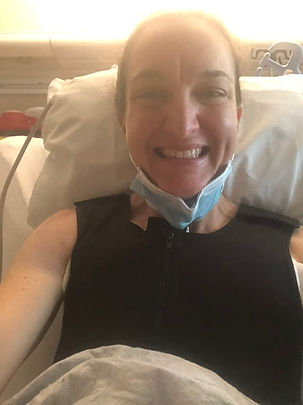"Hey, Jill, it's P W with radiology. Is it a good time to discuss results? I'm calling with your results . . ."
Denial. "Yes, of course, go ahead."
I was seeing patients in clinic. My assistant looked over my shoulder as I wrote on a post-it note, "invasive ductal carcinoma."
I wadded up the note and threw it away. This was not happening. I instructed my medical assistant that this call had not happened and that she didn't know anything. I was not ready to confront this reality. The only reason anyone knew anything is that I had rearranged my schedule for the biopsy.
I continued on with clinic. I was still the same person I had been five minutes before. I needed to get through the day, go home and talk to my husband about the facts, and then decide how to react.
Before that could happen, though, my senior partner called me into her office. "Don't you want to go home?" she encouraged.
Anger. "How did she know? How dare anyone force me to confront this before I am ready!?" I called my husband sobbing with the news. "I'm so sorry," I apologized. "I wanted to tell you first. But now everyone knows somehow and I cannot bear it."
Bargaining. I'm sure I'll just need to have surgery and then I can get my life back to normal.
It took forever after surgery to get the results, but I had to have chemotherapy. "You could try cold-capping to prevent going bald," they said, "but even with that, you will lose a lot of hair."
Depression. It was the pandemic. I went to all my appointments, my surgery, and my chemotherapy cycles alone. Work became complicated, so I took a leave of absence. We all agreed that my parents wouldn't drive across the country to visit because I couldn't deal with either them or me getting Covid in the middle of chemotherapy. We hardly even saw my local stepkids for the same concerns. I felt untethered and hopeless. I wanted to give up . . . on everything.
Looking back, I think my husband single-handedly held our lives together. He held me, and he held me together.
Acceptance. Maybe the first sign of acceptance was with my cancer friend Debbie, and we agreed that we were grateful to at least have a serious problem that we could talk about, different from so many stigmatized conditions--especially HIV and mental illnesses--with which many suffer in silence, even more alone than I felt, waking up to an empty room, newly breastless, after bilateral mastectomy.
My hair has grown back, and I have a whole new and full and different life now. On my 1-year anniversary of completing chemotherapy, I finally attained my goal of finishing the Triple Crown of 200-milers.
Thank you for making space for me to share some of my journey with you. What do you need space to explore? Please reach out if you need an adventure buddy, or simply some advice about gear and weathering adverse conditions.
Sincerely,
Jill

Last run with killer tits, Cirque of the Towers, Wind Rivers, WY, featuring L.C. (for Llama Corn), a gift from my dear friend and mentor Connie. Photo: Phil Lowry

Post-op selfie at the University of Utah.

Cold capping because I'm vain. Icing my hands because I'm a surgeon. Icing my feet because I'm a runner.
Photo: Theresa with Penguin Cold Caps.

Right: One year after my diagnosis, on top of Mailbox Peak in Western Washington. I found a sticker I liked! Photo: Phil Lowry
Contact me about:
What resources would you like to see here?
What problem can I help you navigate?
What are the top two barriers preventing you from engaging with a coach?
A journey of a thousand miles begins with a single step.
- LAO TZU

